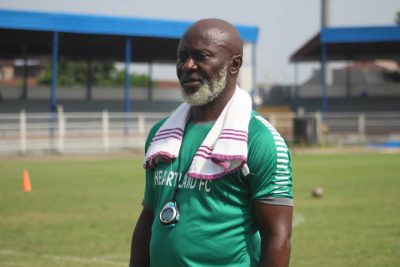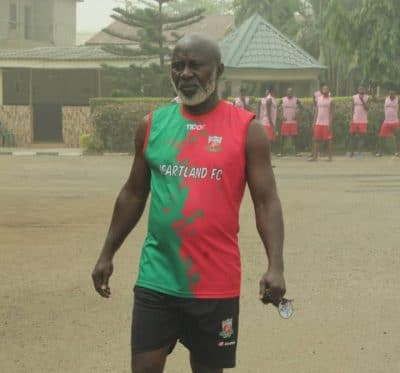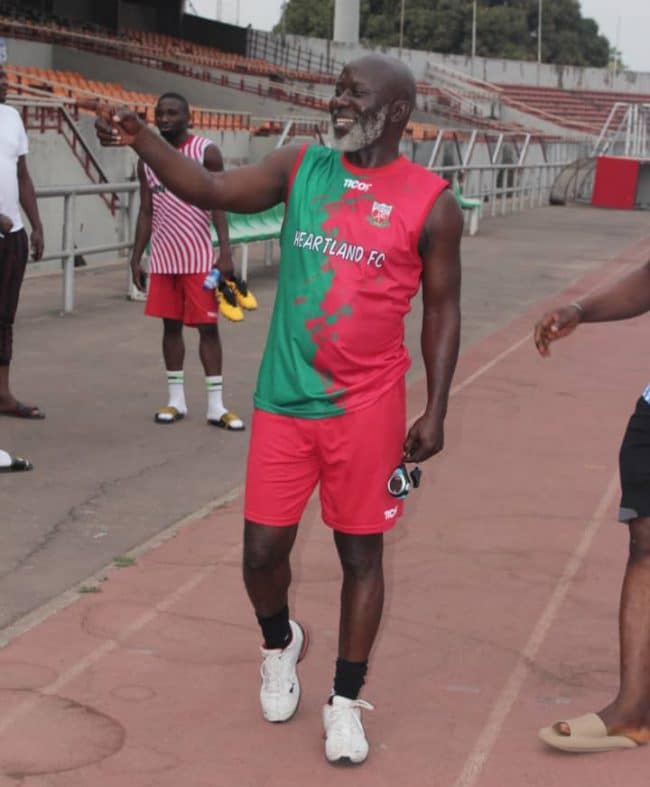Christian Obi, a former Nigeria goalkeeper, has reeled off his longstanding secret about having to endure and later overcame a ‘useless child’ stigma, clad on him by his own parents just because he decided to take football as a profession against their wish and command, Completesports.com reports.
Obi, now 54, would go on to make an illustrious achievement in his footballing career, including featuring in the 1988 pre-Olympic Games Soccer in Seoul, South Korea, where the then Iwuanyanwu Nationale FC of Owerri represented Nigeria.
Obi is the current chief coach of Heartland FC (former Iwuanyanwu Nationale), following the departure of Fidelis Ilechukwu to Plateau United.
Before taking to coaching, Obi helped the Flying Eagles win bronze medal at the FIFA U20 World Cup finals in Moscow, Russia, including career spells at defunct Vasco Da Gama FC, Julius Berger and Iwuanyanwu Nationale.

As a product of University of Ibadan, Obi used the opportunity of the monthly ex-University of Ibadan ex footballers association’s interactive platform to reveal how his parents vehemently opposed his career choice and his early progression in the game with success at the World Youth Games in Cardif, Scotland, in 1981 with Black Rocks after secondary school educación at Nsukka High School.
Also Read – Zola: Osimhen Is Lukaku’s Heir
“Football was a game played with very great passion then and this was a major factor in the success I achieved despite my parents disposition to my becoming a footballer,” Obi said.
“My parents had strong opposition to my decision to play football. It was so difficult to the extent that they called me a ‘useless Child’.
“While growing up, my parents never supported my playing football, being the first child of fifteen children. And more so, football was never seen as a lucrative profession then. Anyone playing football was seen as a ‘useless person’.
“I was still a student at Nsukka High School then. But I stuck to my decision because of my passion”.
Obi also recalls that his parents’ perception later changed when the dividend of the game started rolling in.
“But as fate would have it, while still a student of Nsukka High School in Enugu State, my football prowess began to manifest while featuring for Blue Diamonds FC, Nsukka,” he explained.

“I was a student of Nsukka High School between 1975 to 1980. After my secondary school education, I represented the Youth Sports Federation of Nigeria (YSFON) in a youth tournament in Cardiff in 1981. I played for Enugu Black Rocks FC and we won gold medal in the tournament.
“When we came back from Cardiff, I was drafted into Vasco Da Gama FC, Enugu and from there to Julius Berger FC, Lagos. In 1987, I joined Iwuanyanwu Nationale FC of Owerri but returned to Julius Berger FC the following year where I remained till 1996”.
Obi was a part of the Super Eagles squad handled by Dutchman, Clemens Westerhof, which won silver medal at the Algiers ’90 Africa Cup of Nations in Ageria, as well as a member of the Nigeria’s 5-A-Side squad to the 1992 Championship in Hong Kong.
Obi reflects on the best and worst moments as a national teamplayer.
“My best moment was at 1985 FIFA U-20 World Cup in Moscow when I saved three penalty kicks to help Nigeria win bronze medal at the junior World Cup, while my worst moment was during the FIFA World Cup qualifier against Cameroon at the Adamasingba Stadium in Ibadan. That was in 1989,” the Heartland FC gaffer recalled.
“I was the sure favourite to be in goal, but a couple of days before the match, I suffered a severe ankle injury which knocked me out of the match and Peter Rufai had to be called up to man the goal for Nigeria. That incident put paid to my exposure to the World as that was what that match stood for, for me.”







